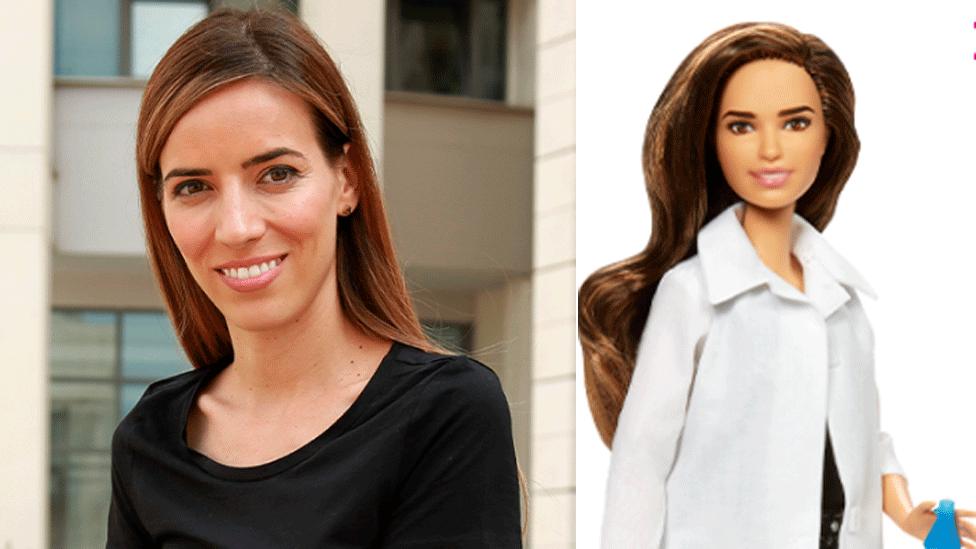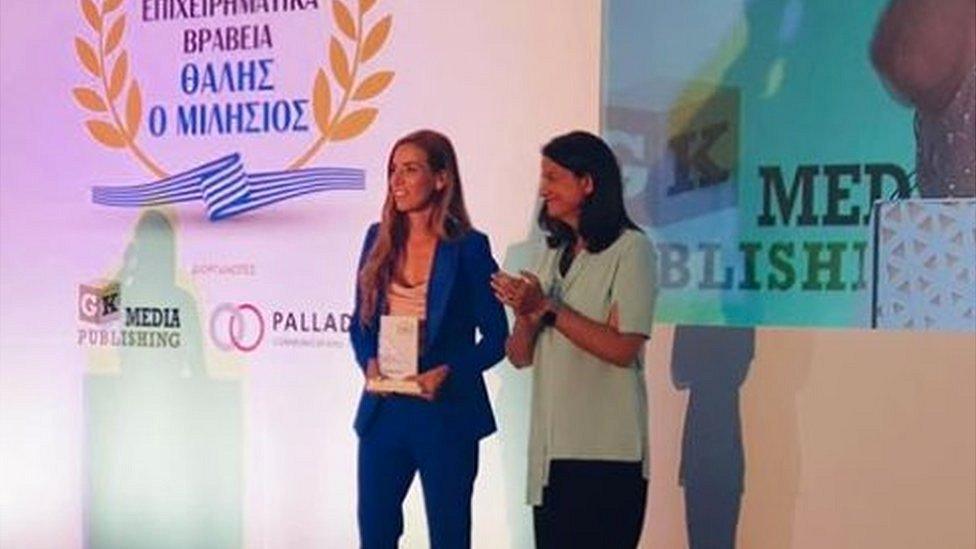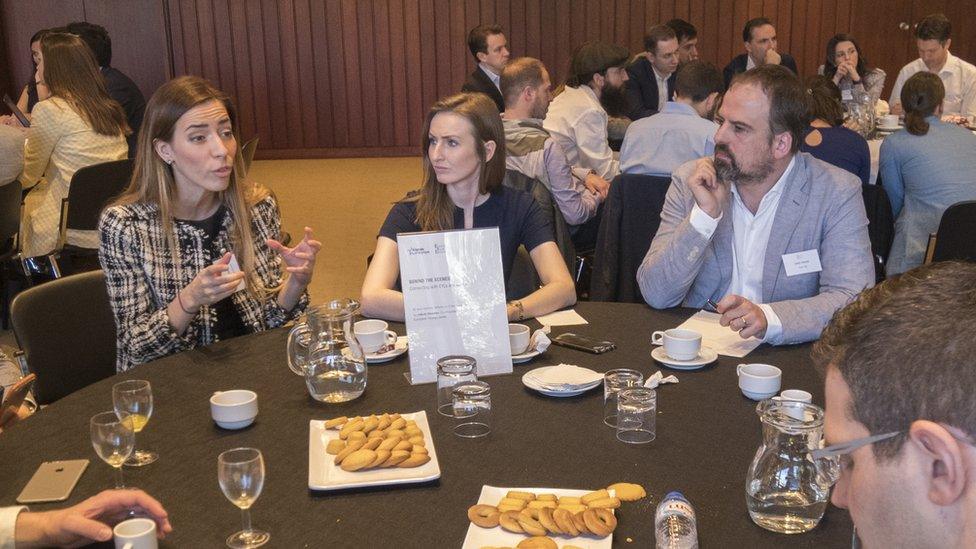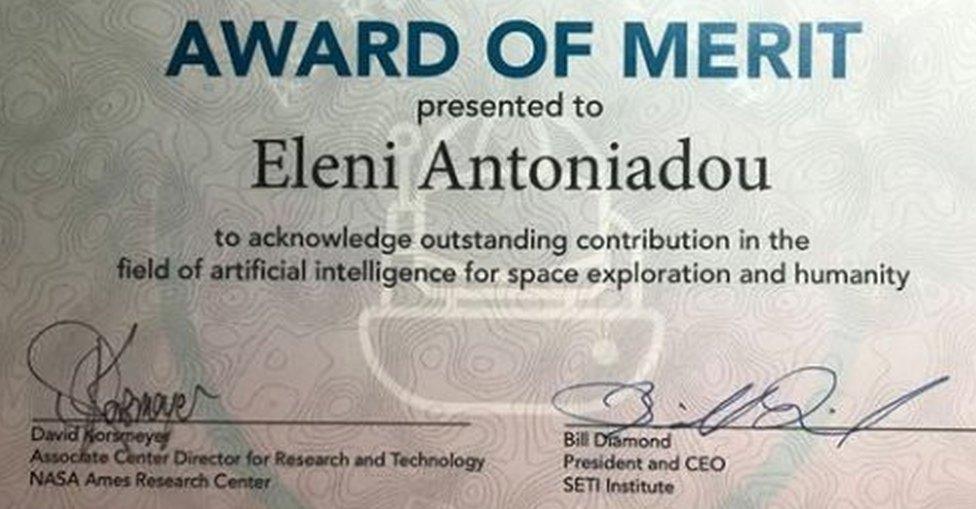Why Greeks question this role model's credentials
- Published

Eleni Antoniadou was showcased by Mattel as one of its Barbie role models this year on the doll's 60th anniversary
She has won awards and accolades, and has been feted internationally for her scientific work, but now a woman hailed as one of Greece's youngest and brightest minds has come under more intense scrutiny than ever before.
The rise and possible fall of Eleni Antoniadou, 31, has become the subject of intense discussion among Greeks.
For years she has been giving interviews portraying herself as a researcher working for Nasa; an expert on regenerative medicine; a maker of cutting-edge artificial organs; a passionate activist against organ trafficking; and a trainer of astronauts.
But it seems that not a single Greek news outlet, out of dozens that have interviewed her, ever bothered to check if everything that had been attributed to her was entirely accurate.
The tipping point came earlier this month when Greek Education Minister Niki Kerameus handed Ms Antoniadou an award at a privately organised event for her contribution to science.

The education minister handed Ms Antoniadou an award and praised her work at Nasa and in medicine
The minister later posted a photo on her Facebook account and borrowed a quote from Antoniadou: "You can become whatever you are dreaming of."
This provoked a response from a number of Greek scientists, who spend most of their days carrying out lab research and have little time or inclination for publicity.
A Greek professor who teaches at a French university decided to do a detailed search online to see how it was possible for such a young person to have accomplished quite so much.
When he posted his findings on social media, there was outrage among the academic community. Others followed suit, including Greek Hoaxes, a group dedicated to uncovering fake news.
Greek Hoaxes accused Ms Antoniadou of misrepresenting her achievements and hit back with a series of counterclaims.
What she has achieved:
Claim: She worked on the world's first artificial trachea that was successfully transplanted to a patient.
Counterclaim: She was a postgraduate student at UCL and was remotely involved with the surgery. The transplant ended with one of the biggest scandals in modern medicine, covered here by the BBC. The patient died after his body did not accept the transplant. Long after his death, Ms Antoniadou gave interviews in Greece saying how she had saved the patient's life and how the patient was living a normal life.
Claim: She has been working for a number of years as a researcher at Nasa.
Counterclaim: She attended a 10-week summer school there and took a lot of pictures around the US space agency's facilities wearing clothes with the Nasa logo. Nasa has denied she works directly for the agency, but has not excluded the possibility that she may be working as a sub-contractor.
Claim: She has called herself a PhD.
Counterclaim: She holds two postgraduate Masters degrees.

In 2017, Eleni Antoniadou (L) took part in a Lisbon seminar for European Young Leaders
Claim: She is a successful entrepreneur and CEO of a company called Transplants without Donors that makes artificial transplants.
Counterclaim: Her company does not appear anywhere and the internet domain that it owns is inactive.
Who did she convince?
Greek media had for years portrayed and promoted her as the brightest mind Greece has produced in decades. The constant publicity often culminated in various kinds of honours.
Global toy maker Mattel has even made a Barbie doll looking like her, as part of its series "Sheroes".
Allow X content?
This article contains content provided by X. We ask for your permission before anything is loaded, as they may be using cookies and other technologies. You may want to read X’s cookie policy, external and privacy policy, external before accepting. To view this content choose ‘accept and continue’.

And the centre-right European People's Party tweeted a poster with the most important Greeks of the past century including her image at the centre.
She even managed to get on the lists of the BBC's 100 Women for 2014 and Forbes' 30 Under 30 for 2015.
How has she responded?
As the stories about the young scientist began to swirl, Eleni Antoniadou posted a cropped image of a Nasa award, external of merit on social media insisting she had been working for Nasa, and she denied trying to compete with older academics.

"Every day I continue to learn by participating in simple or more complicated projects, like that of AI at Nasa with which I'm involved lately," she wrote.
"For me the goal was never to compete with academia or compare my first steps in science as a new researcher with people who have been around for decades. At the end of the day, the important thing is to work always collaboratively, by helping the people around you go forward and not to go a step downwards."
The BBC tried to get in touch with Ms Antoniadou but she was not available for comment.
You might also be interested in:
Greek PM Mitsotakis on the lack of women in government